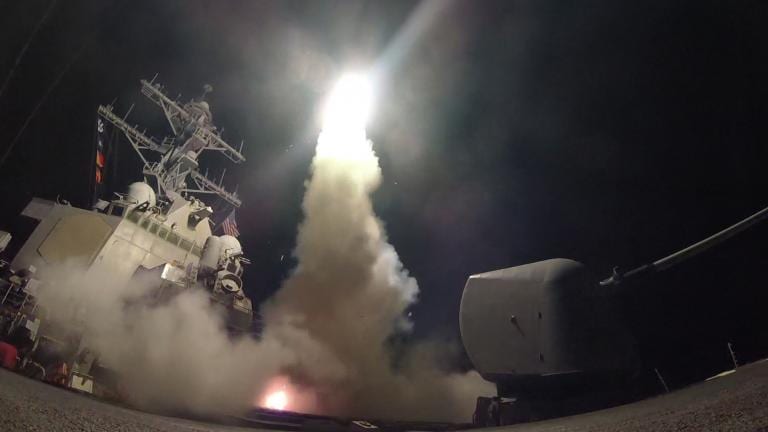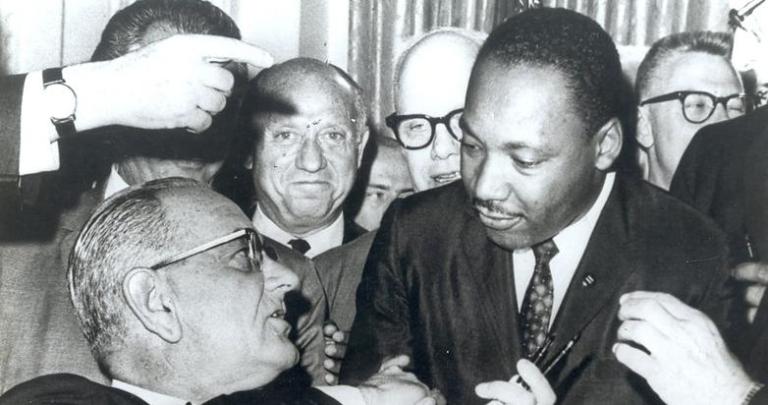The following essay was coauthored by Charles F. Aked and Walter Rauschenbusch on July 8, 1915, in response to the current events of their day. The authors conclude their essay by welcoming its publishing and reprinting by “anyone who will give publicity to this protest.” Given the current events of our day, including the president’s recent tweet that “the United States just spend Two Trillion Dollars on Military Equipment” that it is willing to use on Iran, this “protest and plea” is as relevant as ever, despite its occasionally archaic language (especially regarding gender). Since this essay is unavailable outside of archives, I am responding to the authors’ call to give their essay publicity by publishing it unedited and in its entirety. For more on what I call Rauschenbusch’s realist nonviolence, see my forthcoming book A Field Guide to Christian Nonviolence (Baker Academic), coauthored with Myles Werntz and previewed in Sojourners Magazine.

PRIVATE PROFIT AND THE NATION’S HONOR.
________
A PROTEST AND A PLEA,
BY
CHARLES F. AKED, D.D., LL.D.,
Minister of the First Congregational Church at San Francisco; formerly of Pembroke Baptist Church, Liverpool, England; resident in America since 1907; citizen of the United States since 1913.
WALTER RAUSCHENBUSCH, D.D.,
Professor of Church History at Rochester Theological Seminary; Author of “Christianity and the Social Crisis,” etc.; a native born citizen of the United States, born of American citizens of German blood.
________
In common with all other citizens of the United States we are morally involved in the trade in arms and ammunition. We wish to cleanse our conscience, at least, by protest.
________
1. It is common knowledge that enormous shipments of arms and ammunition have been made by American factories, and that more enormous shipments have been ordered. Our country is becoming a workshop of death. This business is highly lucrative and therefore alluring. Plants built to turn out locomotives, airbrakes, and typewriters have been refitted to manufacture guns and shrapnel. The largest banking house in the country is acting as agent and middleman, and the profits are so large as to arouse protest in Great Britain.
“Our country is becoming a workshop of death. This business is highly lucrative and therefore alluring.”
2. This war trade is not for patriotism but for profit. It exhibits capitalistic industry on one of its lowest levels. Capitalism has often sacrificed the higher values of humanity to make big profits. Unless restrained by the State, it has used up its workers, even women and children. It has financed the liquor business and fought for its right to make profit from the moral degradation of the people. Now, in the agony of the nations, it works overtime to manufacture death. Here is a given quantity of shrapnel ready for export. The profit on it is $100. The probably number of lives it may kill, let us say, ten. $10 bounty on the scalp of a man, the son of a mother! Our ammunition is known by its killing efficiency. Thousands of lonely graves tell the take of large dividends running into American pockets. German newspapers have proposed to add the words, “American ammunition,” to the reports of battles where we have been silent allies.
“This war trade is not for patriotism but for profit. It exhibits capitalistic industry on one of its lowest levels. Capitalism has often sacrificed the higher values of humanity to make big profits.”
3. Though this business is carried on by private capital for profit only, its magnitude today is such that it involves the nation. Foreign people know nothing of the Bethlehem Steel Words, the American Locomotive Company, or the Westinghouse Air Brake Company. They see a stream of war-supplies issuing from America, and the nation as a whole is charged with the responsibility. A few will pocket the profits; our nation will bear the ill-will created by this industry and the sense of shame that may come to us when history writes her verdict on this fateful year. In fact we are jointly responsible. No one can trace how widely the industrial and intellectual forces of our country are indirectly tributary to the success of the war traders. Our government has the power to forbid the exportation of arms. If the nation is silent, it consents to what is done. If our own citizens were being killed in large numbers by some rapacious form of industry, an awakened conscience would justly hold us all responsible for permitting it. When the injury is done abroad, our consent as a nation, in the common judgment of humanity, stands out even more clearly.
4. If we accept the inherited ethics of political life at all, the nations at war have a terrible warrant for their energy in constructing and using the forces of death. Each nation believes it is fighting for the integrity of its land, the safety of its homes, the preservation of its historic institutions, and its future freedom and greatness. When any nation sees itself threatened with dismemberment of its territory, the ruin of its efficiency, the breaking of its spirit, and the emasculation of its collective virility, there is a sombre remnant of moral dignity even in acts of war. But our nation is under no such stress. Our war industry gets no justification from the right of self-defense. With us it is a question of cash. In our Revolutionary War a German princeling sold the military services of several thousand Hessians to England. They are held in contemptuous remembrance in our history. Why? They fought efficiently. But they fought the battle of an alien country for hire. Is there any moral analogy here?
“Our war industry gets no justification from the right of self-defense. With us it is a question of cash.”
5. The Christian sentiment of our people has taken high moral ground on the war questions. We have pitied the European nations for their bleeding desolation. We have lectured them on their madness. We have solemnly met, at the call of our President, and prayed Almighty God to end the war. But when lucrative contracts came our way, a tremor of cupidity ran through financial circles, certain stocks went up by leaps and bounds, and the vast social resources of America turned around to feed and stoke the fires of destruction. Where was the effectiveness of the American conscience then? The desire for peace among the nations has been one of the noblest elements in our national faith, but the stronger that desire has been, the more shocking is the contradiction between our professions and our practice. We are in the position of a Christian gentleman who sincerely hates the liquor traffic but can not resist the attractive rents offered by the liquor trade for his real estate. All honor to those business men who refused on moral grounds to handle war contracts! They deserve more than the murmur of surprise and respect which greeted their action. If this war proves to be the bloody angle at which the road turns from ages of warfare to an age of peace, History for centuries to come will study the part played by different nations on this Calvary of humanity. Is America then to stand in the sight of posterity with a bag in its hands?
6. Perhaps the most dangerous product of the war trade is not the ammunition sent abroad, but the financial interests built up here at home. Peace would be a calamity to them. If sincere negotiations for peace should begin tomorrow, their stock would tumble. We know how deeply and insidiously commercial interests can influence the press when a change in public opinion threatens their profit. We know by bitter experience what political pressure they can bring to bear. The future of these war interests depends wholly on the political action of governments. Is it likely that they will flourish in our country without registering their existence in national politics? Enormous pressure is said to have been brought to bear on the President in May and June to issue an ultimatum to Germany and we have trembled on the brink of war. We cannot afford to have such sinister influences at work. Many of us believe that our nation has a peculiar mission to restore peace. Nothing is so likely to tamper with our judicial qualities, to undermine the confidence of other nations in our sincere friendship, and thus to frustrate that mission of peace, as the growth of these war interests. They will create an American “war party.” When the foreign market fails, they will turn to the home market, and we shall feel their influence in the demand for American militarism.
“They will create an American ‘war party.’ When the foreign market fails, they will turn to the home market, and we shall feel their influence in the demand for American militarism.”
7. The war trade is excused on the ground that international law permits the exportation of arms by private citizens of a neutral nation. No one denies the legality. But an action may be legal, and yet selfish, unfair, and dangerous. A legal right, if pushed too far, may become a moral wrong. Jefferson in 1793 defended the right of Americans to export arms to France because it would be a hardship to stop their regular line of business, which might be “their only means of subsistence.” Such reasoning has little application to a huge national trade, newly developed for this war, and diverting our industry from peaceful trade to militarism. Even in international law the trade in arms and ammunition is on the thin end of what is permissible. Governments can not go into it without losing their neutral standing. The shipments of private citizens can be confiscated without redress if captured, and even the ships carrying them can be destroyed in case of need. Our nation would be far safer against the risk of war if no ammunition were being carried on the same ships with peaceful supplies and passengers. Amid the terrible dangers of this world-war this questionable private right should be suspended for the sake of our own public welfare.
“An action may be legal, and yet selfish, unfair, and dangerous. A legal right, if pushed too far, may become a moral wrong.”
8. Our trade in arms is defended on the ground that the sale of arms by neutrals protects small and peaceful nations when attacked by strong militaristic nations. Unless they could purchase arms in case of need, they would have to arm themselves the more heavily during peace. It may be said in reply that great nations maintain navies for just such cases. The small and peaceful Boer republics had no chance to profit by our war supplies. It was England that bought them and used them against the Boers. If the sale of arms by neutrals were really in the main to the benefit of the little nations, the great nations who have written international law would doubtless long ago have abolished it. At any rate our war caterers are hardly influenced by these unselfish considerations of international policy. They are in the trade because it pays. The rest is smoke which clouds the issue.
“Our war caterers are hardly influenced by these unselfish considerations of international policy. They are in the trade because it pays.”
9. We are also told that an embargo under the present circumstances would work hardship for Great Britain and her allies only, and therefore would have an unneutral bearing. The reply is plain; the exportation of arms under present circumstances also works hardship for one side only, and has a still more unneutral look. The right to lay an embargo is recognized by the Hague convention. Our government prohibited the exportation of arms to Mexico for a time and declared that a neutrality which enabled Huerta to obtain arms through the possession of ports and prevented Carranza from obtaining them through lack of ports, was a mere “paper neutrality.” There has been no explanation by our administration why that action would not be a just precedent in dealing with the one-sided war trade with Europe.
10. Our trade in arms is bad because it is inhuman; it is also bad because it is so plainly and tremendously one-sided that our whole neutrality is tilted to a dangerous angle and needs the prop of labored arguments. However our theories may run, the fact is that we are today part of the economic and military system of Great Britain and her allies. They depend on us. We are so useful to them as a neutral that they are in doubt whether they want us to declare war against Germany. Our partiality is all the more painful because we have allowed Great Britain for many months now to close the free highway of the ocean against our neutral vessels loaded with grain and cotton for Germany. It is safe to say that if our republic were at war and were thus treated, we should cry out from ocean to ocean against such neutrality and friendship.
11. In analyzing our ethical position it is important to inquire whether we have unconsciously and unwillingly been forced by circumstances into this false position, or whether we inwardly consent to an welcome the opportunity to be unneutral in fact while we remain neutral in profession. A New York daily, in an argument for maintaining our present status of neutrality, said: “The maximum of actual damage we can do her (i.e. Germany) we are doing now.” The partisan spirit is so intense that probably others are secretly glad that we can at least contribute our share to the dissolution of Austria and the overthrow of Germany by furnishing the tools. Yet that attitude is essentially base and treacherous. Are we to hoist the white flag of neutrality and cry, “Friend, friend,” and under that cover to intentional harm? If any one has allowed such thoughts to lodge in his mind, he has forfeited his right to condemn faithlessness in others.
12. It is a poor neutrality that will not work both ways. An even-handed and truly neutral policy ought to be reversible. But if the situation of the belligerent nations were exactly reversed, should we maintain the same policy? For argument’s sake let us imagine—what is very unlikely—that a series of disasters overtook the British fleet so that it lost control of the seas. The German fleet could then intercept neutral shipping as the British fleet is intercepting it now. American cargoes of food destined for England would be taken to German ports. The British people would eat potato bread and have strictly limited quantities of that issued on government bread cards. The Teutonic allies could buy unlimited American guns and shot and shell to overwhelm English armies or ships. How long would our present logic seem convincing then? How long would it be before we laid an embargo on munitions of war and demanded that American food and cotton should have free access to ports not blockaded? Is a neutrality which does not bear reversal good enough to satisfy our sense of equity and national honor?
“On grounds of humanity we should refuse to feed the conflagration of civilization to secure financial profit for ourselves. On grounds of public policy we should prevent the further growth and insidious influence of great social forces directly interested in the continuance and spread of war.”
What ought we to do? We should prohibit the exportation of arms and ammunition. On grounds of humanity we should refuse to feed the conflagration of civilization to secure financial profit for ourselves. On grounds of public policy we should prevent the further growth and insidious influence of great social forces directly interested in the continuance and spread of war. On grounds of neutrality and national honor we should escape from a situation so uneven, which puts the sincerity of our high professions in a dubious light. Early in the war President Wilson set the influence of the government against the raising of war loans in this country, and the good sense of the people applauded him. We ought at that time to have applied the same principle to the exportation of arms. Today far more malignant resistance will meet such a proposal. It is commonly assumed that so powerful a trade can no longer be curbed. If that is true, the better self of the nation is once more helpless against mercenary interests. In that case we ourselves now have a war party which dominates our politics. A strong protest from the moral forces of the nation would put that question to the test. Even if unsuccessful it would at least vindicate the sincerity of that part of the nation which is not filling its pockets. We can not afford to cry out against war and to get rich on war. America can not afford to garnish the outside of the cup with peace congresses while the inside of the cup is filled with the red wine of war profits.
________
This material is released to the press. We shall welcome the aid of anyone who will give publicity to this protest by publishing, reprinting, quoting or discussing it.
Let every man consider whether his hands are stained by this traffic, and what he has done to cleanse them.












